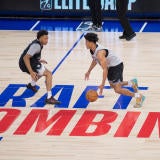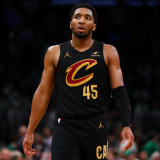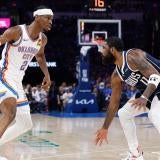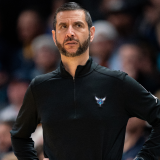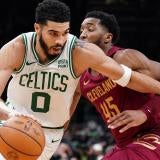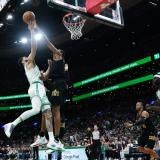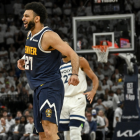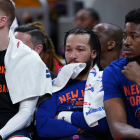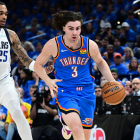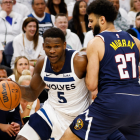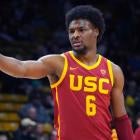On April 24, 2014, the Los Angeles Clippers took a 2-1 lead in their first-round series against the Golden State Warriors, surviving a Stephen Curry flurry to win 98-96. It was an ugly victory, but a symbolic one; guard Jamal Crawford told reporters there would be more adversity ahead and they needed to stick together to overcome it. He had no idea how right he would be.
On April 25, 2015, TMZ published a recording of then-Clippers owner Donald Sterling telling V. Stiviano, his mistress, not to bring black people to games, and scolding her for posing with Magic Johnson.
Immediately, the Clippers' world changed. Curry was no longer their biggest problem, not with Sterling's racist remarks putting them in the middle of a firestorm. They had an emotional meeting, in which DeAndre Jordan said he didn't want to play in their next game. Some teammates agreed. Friends and media wanted to know how the players felt and what they were going to do.
"It was a shitshow," Chris Paul says in "Blackballed," which debuted on Quibi this week.
In advance of the documentary series, then-Clippers forward Matt Barnes spoke to CBS Sports about Sterling, race in sports and the team's eventual downfall.
Barnes participated in "Blackballed" because he wanted "to tell our side," he said. In the documentary, the scandal is positioned as a turning point for player empowerment. Faced with such overt racism, players around the league loudly demanded Sterling's ouster.
"This is kind of where it started," Barnes said. "The Trayvon Martin hoodie stuff, and LeBron kind of stepping up and being one of the few superstars, you date back to the '60s and '70s," to address serious social issues.
The following Q&A has been lightly edited for clarity and flow.
CBS Sports: By talking about Sterling, you put yourself back in the middle of all of this. How do you look back on it now?
Matt Barnes: It was just a crazy situation. It was unprecedented. It was arguably the biggest scandal in the history of basketball. And to have that happen at the beginning of the playoffs when we're taking on a tough, young Warrior team, a team that after that season became one of the greatest dynasties of all-time, it was just tough. Because at the time of the playoffs, the only thing that we focus on is our opponent. And day in, day out, the preparation and the execution and the adjustments we have to make. And then to have this thrown on our plates, nearly 36 hours before a game, was unbelievable.
And to me, he's not the only owner or CEO of a major company that thinks that way; he was just the only one dumb enough to get caught saying it. So there was a lot of people telling us what we shouldn't do, but, like I said, it was so new and it happened so fast for all of us, we kind of just came together and did what we felt was best for ourselves and our team and our family.
CBS: You've said that, at the time, you weren't surprised by Sterling's comments -- you knew his track record. It's interesting that now, with some distance from it, you call it the biggest scandal.
Barnes: Yeah, I think I'll give you two reasons why I wasn't surprised. One you mentioned, because of his track record, people had known what kind of slumlord he was and incidents and run-ins he'd had. And to me winning starts at the top, and that was one of the main reasons why the Clippers had never been good was because he'd been the owner. And then the other reason why I say it wasn't a big deal is because I've faced real-life racism. In high school I had a situation where someone was calling my sister "n-----." I was the big brother, I end up beating him up and then a day and a half later my whole school is vandalized by the KKK, having classrooms and a bathroom burned down and swastikas and "die n-----," mannequins hanging from nooses. All this kind of stuff happened to me at my high school.
So to me, people saying ignorant stuff like that was never a big deal because I've seen real things happen from it. And I understand the sensitivity of everything right now, where words hurt, and they do, it was a disgusting display of who he really was. But at the same time I'll repeat myself: There's plenty of other CEOs, there's plenty of other owners who feel that way. They just haven't been caught saying it. So to me, I've really been quote-unquote woke when it comes to racism because I've faced so much in my life and I kind of have an attitude of, OK this is serious, OK, my school burning, classrooms at my school and other stuff, that's very serious. But for an old guy to say the dumb stuff he said, although it was completely inappropriate and disrespectful, it didn't really register at the time on my radar as being something that was going to turn out to be as big as it was.
CBS: The documentary gets into Sterling's history, whereas some people might just remember the scandal and the tape. Is this part of why you wanted to be involved?
Barnes: To me, what he said wasn't even the worst part about him. Obviously, the racism he had toward his tenants. And really getting a chance to know and really look at the history of Donald Sterling, what he said on those tapes was bad, but if you think about the way he discriminated against minorities and how he's been in court since the beginning of time, with him being an owner, not only of teams but an owner of property, he's one of those -- he's a good old boy. And there's a lot of those guys that are on their way out. These are the 70-, 80-, 90-year-old guys that found money in oil and real estate and own a lot of property and own teams and he's not the only one to look at players the way he looked at 'em. He was just the only one dumb enough to get caught. So I think obviously this shines light on how real it is.
And people who try to say, "You know, why are you always bringing race into it?" Because race plays a huge part. And this just highlights all the people that are reiterating that, that race is still a huge part and discrepancy -- not only in the way he talks, but if you look at black owners, black GMs, black head coaches, there's a big void. There's a lot of emptiness when it comes to those positions in basketball.
CBS: You spoke to Jonathan Abrams years ago about racism being an inescapable part of your life growing up. How has your biography shaped the way you look at the racial dynamics of professional sports?
Barnes: It not only shaped my view on how I see professional sports but just the world in general. I was always very proud to be half Italian, half black. And still am to this day. But I think in high school was when I learned that people look at me as a black man. And to give you another example, Obama is biracial but he was our first black president. Growing up, it was never -- you're one or other, so you have a little bit of black in you, you're black. But like I said, the struggle for me is I was never black enough and then I was never white enough so I was kind of on my own when it came to dealing with it from both sides. 'Cause I got it from both sides, you know what I mean? So I was taught at an early age by my dad to fight. And this was the early '80s, and that's just kind of how things were.
You see day to day, but I think the one thing I've taken from this COVID-19 is there's still a lot of hate in this country, from Ahmaud Arbery being hunted down by two white men to there kind of being a double-standard. Imagine black men storming the state capital with automatic weapons: It wouldn't have been a peaceful situation. You even see cops that are just beating the shit out of minorities for social distancing and not having masks on. But then you see some cops doing the right thing and they're handing white people in a park masks. So you see it from a day-to-day perspective not only in sports, in the world every day. But then to see it in sports, to me having an understanding of what the world is really like, that's why it didn't surprise me. It didn't for one second surprise me.
And just recently, there was a guy from the New York Post that was blatantly racist about my show "All the Smoke" with me and Stephen Jackson. And he called us everything but n-----s in his piece. I forgot the guy's name, I don't even want to give him credit. But it just shows that, even in writing, it's still there. All you have to do is look and be open-minded enough to realize it's still there. People don't like to talk about race because it's a very touchy subject, but race plays a huge part in everyday life.
CBS: In "Blackballed," you say that you felt like you let a championship opportunity get away. What's your perspective on that Clippers team now?
Barnes: I think we definitely were one of the most talented teams in the NBA during that "Lob City" era. And it was a situation where egos met maturity met 'I want to be the man' met -- me and Chris Paul want to make this documentary once we're done playing because I think there's such a huge void and missed opportunity during that time. And from the outside looking in you wouldn't really know. And I think now more than ever docs are coming out and kind of giving you the real story behind stuff.
Not that we're "The Last Dance" Chicago Bulls by any means, not even close, but we were a very talented team with a crazy owner -- with a crazy, racist owner -- with a history of losing. We were kind of the team that turned things around there. And I feel from maturity and egos, we let a great opportunity, we let a great three years slip through our hands. And when you look at what happened, it's crazy turnovers by Chris, who's our best player. It's bad calls by the ref. It's timing with Blake (Griffin) and Chris always getting hurt in the playoffs. It was so much deeper than met the eye.
But looking back, being able to win a championship with Golden State in 2017 and seeing how that team got along on and off the court, and then looking back on my Clipper team, like, man, we had a lot of talent. We were beating the Warriors up until the point they went on a run to become a dynasty. Like, we definitely let something go, and it was because of our chemistry and our inability to push to the side and get along.
CBS: So you're saying there could be another documentary beyond this one.
Barnes: I eventually think so. It will probably be once Chris is done playing. He would probably be the person. So that's my space now. You know, I just signed with ICM, so I'm creating all kinds of different stuff here and there and I'm working on a "We Believe" documentary right now as we speak. So I definitely think that, you know, telling that Lob City story, the whole story, I think people would be very interested. Because I think Quibi did a great job of giving people that moment in time, which was maybe a three-week span, but, you know, there was a time from when Blake was signed to all the acquisitions, to grabbing Doc, to grabbing Chris, to grabbing everyone else, that we had a real chance to win. And I think it would be interesting to kind of peel back the layers and, from our perspective, let the world know why we feel like we didn't win. And we had no one to blame but ourselves.







